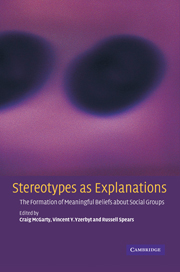Book contents
- Frontmatter
- Contents
- List of figures
- List of contributors
- Preface
- 1 Social, cultural and cognitive factors in stereotype formation
- 2 Stereotype formation as category formation
- 3 Subjective essentialism and the emergence of stereotypes
- 4 The role of theories in the formation of stereotype content
- 5 Illusory correlation and stereotype formation: making sense of group differences and cognitive biases
- 6 Dependence and the formation of stereotyped beliefs about groups: from interpersonal to intergroup perception
- 7 Four degrees of stereotype formation: differentiation by any means necessary
- 8 From personal pictures in the head to collective tools in the world: how shared stereotypes allow groups to represent and change social reality
- 9 Conclusion: stereotypes are selective, variable and contested explanations
- References
- Author index
- Subject index
2 - Stereotype formation as category formation
Published online by Cambridge University Press: 22 September 2009
- Frontmatter
- Contents
- List of figures
- List of contributors
- Preface
- 1 Social, cultural and cognitive factors in stereotype formation
- 2 Stereotype formation as category formation
- 3 Subjective essentialism and the emergence of stereotypes
- 4 The role of theories in the formation of stereotype content
- 5 Illusory correlation and stereotype formation: making sense of group differences and cognitive biases
- 6 Dependence and the formation of stereotyped beliefs about groups: from interpersonal to intergroup perception
- 7 Four degrees of stereotype formation: differentiation by any means necessary
- 8 From personal pictures in the head to collective tools in the world: how shared stereotypes allow groups to represent and change social reality
- 9 Conclusion: stereotypes are selective, variable and contested explanations
- References
- Author index
- Subject index
Summary
In this chapter I explore the contribution of research on category formation to the study of stereotype formation. The rationale for this is fairly straightforward. Stereotypes are based on or rely on categories, and in particular they rely on categories of people. If we accept the additional point that stereotypes are explanations then we are left with an important question: how does categorization contribute to the explanatory power of stereotypes?
As we will see in this chapter the explanatory nature of categories has been acknowledged for a long time. This is seen most clearly when we consider that the use of the term concept in cognitive psychology has been almost indistinguishable from the use of the term category. The term ‘concept’ is synonymous with the assignment of meaning or the development of understanding. If stereotypes are inextricably bound to categories then it should also be the case that stereotypes involve gaining or developing understanding as was argued in Chapter 1. It follows that the cognitive psychological work on category and concept formation should repay a close look.
The path I will follow is first to discuss how that approach that I term the constraint relations formulation helps us to understand treatments of categorization in cognitive and social psychology. I use this formulation to arrive at a summary of some key implications of the categorization process for understanding stereotype formation.
- Type
- Chapter
- Information
- Stereotypes as ExplanationsThe Formation of Meaningful Beliefs about Social Groups, pp. 16 - 37Publisher: Cambridge University PressPrint publication year: 2002
- 18
- Cited by



